初中英语语法——句型转换之同义句
聚焦中考同义句转换十二类型
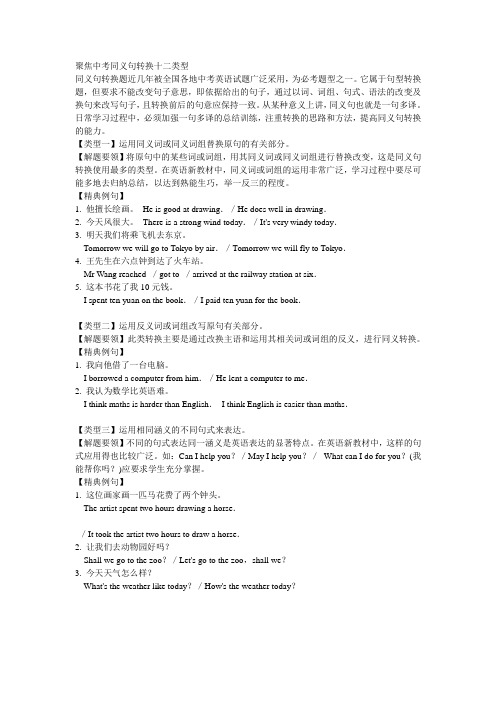
聚焦中考同义句转换十二类型同义句转换题近几年被全国各地中考英语试题广泛采用,为必考题型之一。
它属于句型转换题,但要求不能改变句子意思,即依据给出的句子,通过以词、词组、句式、语法的改变及换句来改写句子,且转换前后的句意应保持一致。
从某种意义上讲,同义句也就是一句多译。
日常学习过程中,必须加强一句多译的总结训练,注重转换的思路和方法,提高同义句转换的能力。
【类型一】运用同义词或同义词组替换原句的有关部分。
【解题要领】将原句中的某些词或词组,用其同义词或同义词组进行替换改变,这是同义句转换使用最多的类型。
在英语新教材中,同义词或词组的运用非常广泛,学习过程中要尽可能多地去归纳总结,以达到熟能生巧,举一反三的程度。
【精典例句】1. 他擅长绘画。
He is good at drawing./He does well in drawing.2. 今天风很大。
There is a strong wind today./It's very windy today.3. 明天我们将乘飞机去东京。
Tomorrow we will go to Tokyo by air./Tomorrow we will fly to Tokyo.4. 王先生在六点钟到达了火车站。
Mr Wang reached /got to /arrived at the railway station at six.5. 这本书花了我10元钱。
I spent ten yuan on the book./I paid ten yuan for the book.【类型二】运用反义词或词组改写原句有关部分。
【解题要领】此类转换主要是通过改换主语和运用其相关词或词组的反义,进行同义转换。
【精典例句】1. 我向他借了一台电脑。
I borrowed a computer from him./He lent a computer to me.2. 我认为数学比英语难。
初三 句型转换(同义句转换)
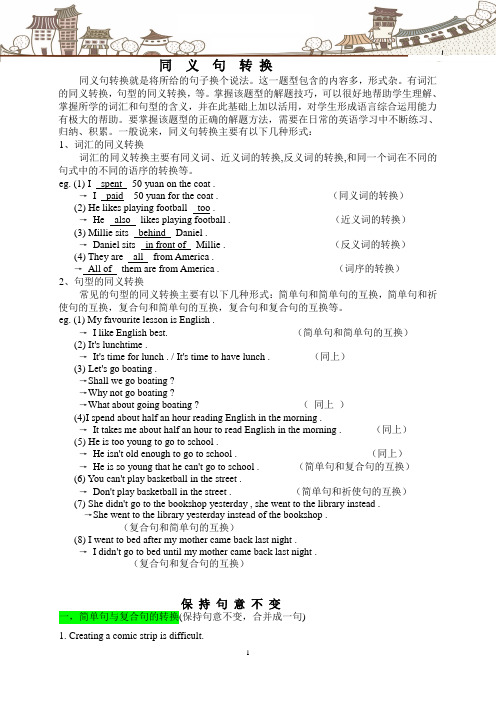
同义句转换同义句转换就是将所给的句子换个说法。
这一题型包含的内容多,形式杂。
有词汇的同义转换,句型的同义转换,等。
掌握该题型的解题技巧,可以很好地帮助学生理解、掌握所学的词汇和句型的含义,并在此基础上加以活用,对学生形成语言综合运用能力有极大的帮助。
要掌握该题型的正确的解题方法,需要在日常的英语学习中不断练习、归纳、积累。
一般说来,同义句转换主要有以下几种形式:1、词汇的同义转换词汇的同义转换主要有同义词、近义词的转换,反义词的转换,和同一个词在不同的句式中的不同的语序的转换等。
eg. (1) I spent 50 yuan on the coat .→I paid 50 yuan for the coat . (同义词的转换)(2) He likes playing football too .→He also likes playing football . (近义词的转换)(3) Millie sits behind Daniel .→Daniel sits in front of Millie . (反义词的转换)(4) They are all from America .→All of them are from America . (词序的转换)2、句型的同义转换常见的句型的同义转换主要有以下几种形式:简单句和简单句的互换,简单句和祈使句的互换,复合句和简单句的互换,复合句和复合句的互换等。
eg. (1) My favourite lesson is English .→I like English best. (简单句和简单句的互换)(2) It's lunchtime .→It's time for lunch . / It's time to have lunch . (同上)(3) Let's go boating .→Shall we go boating ?→Why not go boating ?→What about going boating ? (同上)(4)I spend about half an hour reading English in the morning .→It takes me about half an hour to read English in the morning . (同上)(5) He is too young to go to school .→He isn't old enough to go to school . (同上)→He is so young that he can't go to school . (简单句和复合句的互换)(6) You can't play basketball in the street .→Don't play basketball in the street . (简单句和祈使句的互换)(7) She didn't go to the bookshop yesterday , she went to the library instead .→She went to the library yesterday instead of the bookshop .(复合句和简单句的互换)(8) I went to bed after my mother came back last night .→I didn't go to bed until my mother came back last night .(复合句和复合句的互换)保持句意不变一,简单句与复合句的转换(保持句意不变,合并成一句)1. Creating a comic strip is difficult.It’s difficult _______ _______ a comic strip.2. We learn new words with pictures. We can remember them easily.We learn new words with pictures_______ ________we can remember them easily.3. We buy a special program in order to help the computer recognize our voice.We buy a special program ________ ________ it can help the computer recognize our voice.4. Detective Ken spent a week dealing with the case.Detective Ken a week to deal with the case.5. A team of men spent a whole day moving the ancient building._________ _________ a team of men a whole day to move the ancient building.6. Sally spent about 625 dollars on the iphone4 last Friday.Sally ________ about 625 dollars _______ the iphone4 last Friday.7.Mr. Smith set out early for the airport so that he could catch his flight.Mr. Smith set out early for the airport _________ _________ to catch his flight.8. Detective Ken did a lot about the case in order to find out the truth.Detective Ken did a lot about the case ________ ________ he could find out the truth.9. We learn a language in order to communicate.We learn a language _________ _______ we can communicate.10. The hardworking man went home after he finished all the work that day.The hardworking man ________ go home ________ he finished all the work that day. 二,宾语从句的转换1.. He asked: “ How can I get to the Bund?” (改为间接引语)He asked___________ he __________ get to the Bund.2. Mrs. Lin asked me “Have you finished drawing the picture?” (合并为一句)Mrs. Lin asked me ________ I ________ finished drawing the picture.3. When will we take an English exam? We wanted to know. (改为宾语从句)We wanted to know we take an English exam.4. “Can you help me repair the bike?” Mary asked Jack. (改为宾语从句)Mary asked Jack _____________he _____________ help her repair the bike.5. “Do you always catch such an early train?” The policeman asked the man.(合并为一句)The policeman asked the man ________ he always ________ such an early train.6. Frank asked me, "Have you ever created a comic strip?" (改为宾语从句)Frank asked me whether ________ ________ ever created a comic strip.7. “Mum, was the telephone invented by Bell?” the girl asked. (改为宾语从句)The girl asked her mum ________ the telephone ________ invented by Bell.8. I wondered. Will Jack recognize me after such a long time? (合并两句)I wondered ________ Jack ________ recognize me after such a long time.9. When are we going to visit the museum? Do you know? (改为宾语从句)Do you know when _______ _______ going to visit the museum?10. “Is it the last bus to the city centre?” I asked the driver.(合并为一句)I asked the driver ________ it ________ the last bus to the city centre.11. “Are there any new products for the European market?” the sales manager wanted to know.The sales manager wanted to know _________ there ________ any new products for the European market.12. Could you tell me? How can I deal with all these problems?Could you tell me how _______ _______ deal with all these problems13. “Does anyone need my help with the school project?” The class teacher asked.The class teacher asked ________ anyone ________ his help with the school project. 三,条件状语从句内部以及与祈使句的转换1. Be quick, or you can’t catch the bus.you quick, you can’t catch the bus.2. We will have a barbecue in the forest park if it doesn’t rain this Sunday.We will have a barbecue in the forest park __________ it __________ this Sunday.3. I prefer to sleep with the window wide open unless it’s really cold.I prefer to sleep with the window wide open ________ it ________ really cold.四,其他1. The water is warm. The baby can take a bath in it. (两句合并为一句简单句)The water is ____________ ____________ for the baby to take a bath in.2. Our monitor is too weak to play football any more. (保持原句意思)Our monitor is not ________ ________ to play football any more.3. The box on the shel f is so heavy that the boy can’t carry it. (保持句意基本不变)The box on the shelf isn’t _____________ _____________ for the boy to carry.4. The Korean pop music video Gangnam Style is very popular. Many people would like tolearn the funny dance.The Korean pop music video Gangnam Style is ________ popular ________ many people would like to learn the funny dance.5. This shelf is too small to hold all your books.(保持句意基本不变)This shelf is small it can’t hold all your books.6. I was so lucky that I was in the right place at the right time. (保持句意基本不变)I was ________ _______ to be in the right place at the right time.7 The teacher didn’t answer my question. He asked me another question.The teacher asked me another question ________ of ________ my question.8. Lucy has been to Beijing. Mark has been to Beijing as well.____________Lucy and Mark ____________been to Beijing.9. We can go to the museum by bus. We can go there by underground instead.We can go to the museum _________ by bus _________ by underground.10. We cannot drink sea water. We cannot take a shower with it, either. We can ________ drink sea water ________ take a shower with it.11. George didn’t do his homework. He watched TV news.George watched TV news ________ ________ doing his homework.12. Sam didn’t go with his classmates for the party. He went to see a film alone.Sam went to see a film alone _________ __________ going with his classmates for the party.13. I was the only person who was invited to the party.Nobody ___________ me ____________ invited to the party.14. Yesterday my friend Charlie said sorry to me because he broke my glasses.Yesterday my friend Charlie ________ to me ________ breaking my glasses.15. What would you like to ask besides this question?What would you like to ask _______ ________ to this question?16. The 30th Olympic Games were held in London in 2012.The 30th Olympic Games ________ ________ in London in 2012.17. Remember to say sorry to others if you do something wrong.Remember to ________ ________ others if you do something wrong.18. My daughter studies both singing and dancing in the kindergarten.My daughter studies singing ________ ________ as dancing in the kindergarten.19. Amy looks after the pets when her parents are away from home.Amy the pets when her parents are away from home.20. We cannot predict the exact time and location of earthquake now.________ ________, we cannot predict the exact time and location of earthquake. .21.To do this job well, you need time, and you also need brains.To do this job well, you need time and brains _________ __________.22. Sitting up too late at night is harmful to our health.Sitting up too late at night is ________ ________ our health.23. Why didn’t you tell him the truth when he asked you about his illness?________ ________ tell him the truth when he asked you about his illness?。
初中英语句型转换和同义词转换
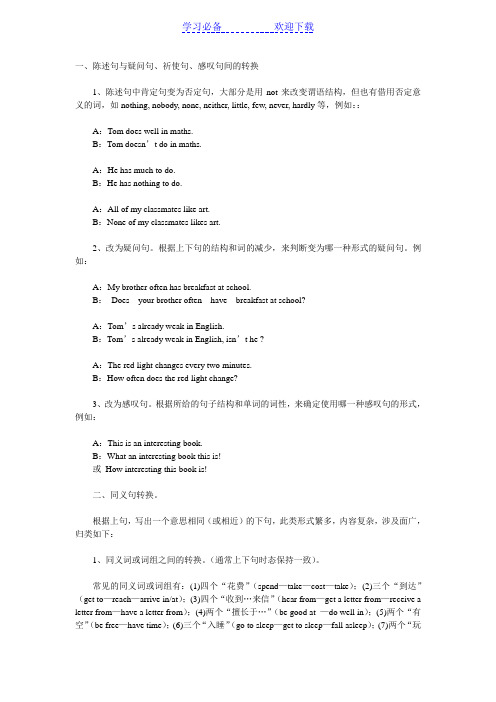
一、陈述句与疑问句、祈使句、感叹句间的转换1、陈述句中肯定句变为否定句,大部分是用not来改变谓语结构,但也有借用否定意义的词,如nothing, nobody, none, neither, little, few, never, hardly等,例如::A:Tom does well in maths.B:Tom doesn’t do in maths.A:He has much to do.B:He has nothing to do.A:All of my classmates like art.B:None of my classmates likes art.2、改为疑问句。
根据上下句的结构和词的减少,来判断变为哪一种形式的疑问句。
例如:A:My brother often has breakfast at school.B:Does your brother often have breakfast at school?A:Tom’s already weak in English.B:Tom’s already weak in English, isn’t he ?A:The red light changes every two minutes.B:How often does the red light change?3、改为感叹句。
根据所给的句子结构和单词的词性,来确定使用哪一种感叹句的形式,例如:A:This is an interesting book.B:What an interesting book this is!或How interesting this book is!二、同义句转换。
根据上句,写出一个意思相同(或相近)的下句,此类形式繁多,内容复杂,涉及面广,归类如下:1、同义词或词组之间的转换。
(通常上下句时态保持一致)。
常见的同义词或词组有:(1)四个“花费”(spend—take—cost—take);(2)三个“到达”(get to—reach—arrive in/at);(3)四个“收到…来信”(hear from—get a letter from—receive a letter from—have a letter from);(4)两个“擅长于…”(be good at —do well in);(5)两个“有空”(be free—have time);(6)三个“入睡”(go to sleep—get to sleep—fall asleep);(7)两个“玩得开心”(enjoy oneself—have a good time);(8)“给…打电话”(call sb—telephone sb—ring sb.a call—make a telephone to sb.)(9)“飞往...”(fly to...—go to...by air/plane)(10)“自学”(teach oneself—learn...by oneself)(11)在...方面帮助help...with...—help...(to)do...(12)在...差be weak in...—do badly in...(13)能/会...can—be able to(14)更喜欢...like...better than...—prefer...to...(15)充满了...be full of...—be filled with...(16)放弃干...give up doing...—stop doing...(17)不再...no longer—not ...any longer(18)照顾/保管take care of...—look after(19)展览on show—on display(20)阻止...干...stop...from doing—keep/prevent...from doing (21)由于thanks to—because of…(22)举手hands up—put up one’s hands(23)最后,终于at last—in the end(24)与…不同be different from…—be not the same as…(25)从…借入…borrow…from…—lend…to…(26)乘公汽/火车/的士go to…by bus/train/taxi—take a bus /train/taxi to…(27)乘自行车去…go to…by bike—ride a bike to…(28)为…感到自豪be proud of…—be the pride of…(29)步行去…walk to…—go to…on foot (30)独自地by oneself —alone等。
句型转换之同意句
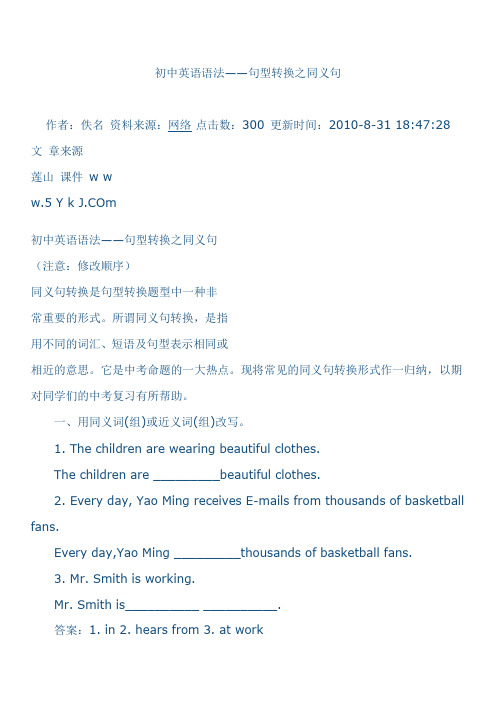
初中英语语法——句型转换之同义句作者:佚名资料来源:网络点击数:300 更新时间:2010-8-31 18:47:28文章来源莲山课件w ww.5 Y k 初中英语语法——句型转换之同义句(注意:修改顺序)同义句转换是句型转换题型中一种非常重要的形式。
所谓同义句转换,是指用不同的词汇、短语及句型表示相同或相近的意思。
它是中考命题的一大热点。
现将常见的同义句转换形式作一归纳,以期对同学们的中考复习有所帮助。
一、用同义词(组)或近义词(组)改写。
1. The children are wearing beautiful clothes.The children are _________beautiful clothes.2. Every day, Yao Ming receives E-mails from thousands of basketball fans.Every day,Yao Ming _________thousands of basketball fans.3. Mr. Smith is working.Mr. Smith is__________ __________.答案:1. in 2. hears from 3. at work简析:英语中有不少同义、近义词(组),在平时学习中要注意总结归纳。
如:enjoy oneself/have a good time, look after/take care of,difficult/hard, can/be able to,over/more than,receive(get)a letter from/hear from等等。
二、用反义词(组)改写。
4. Chinese is more popular than Japanese.Japanese is __________ popular __________ Chinese.5. The runner couldn't catch up with the others in the race.The runner _________ __________ the others in the race.6. A computer is more useful than a VCD.A VCD is not _________useful _________a computer.答案:4. less, than 5. fell behind 6. as,as简析:此类转换应注意有时主语位置会改变,并要特别总结归纳反义词(组)。
人教版七年级英语下册复习:同义句转换

人教版七年级英语下册复习:同义句转换一.句型转换(共18小题)1.He walks to school every day.(同义句替换)He goes to school every day.2.People often go to work by underground. (同义转换)It take the underground to work.3.I don't eat anything today.(同义句)I today.4.Do you want to have some tea?(同义句)you to some tea?5.Don't be late for school.(同义句转换)Don't for school.6.She has no sister. (同义句)She sister.7.What other animals do you like?(改为同义句)do you like?8.The picture is a little ugly.(同义句)The picture is ugly.9.Now it's five thirty.(改为同义句)Now it's five.10.He isn't tall or short.(改为同义句)He is of .11.Cathy and Ruth look the same.(改为同义句)Cathy Ruth.12.The movie is very exciting.I want to see it again.(同义句)The movie is exciting I want to see it again.13.He didn't come to my birthday party.I was very surprised.(同义句),he didn't come to my birthday party.14.In spring,our school is filled with green trees and beautiful flowers.(保持句意不变)In spring,our school is green trees and beautiful flowers15.There are 11 players in football team.(保持句意不变)A football team11 players.16.Tom rides his bike to visit his grandparents. (同义句)Tom his grandparents.17.It's time for your homework. (同义句)It's time your homework.18.He does exercise after he runs every day. (同义句)He after he runs every day.人教版七年级英语下册复习:同义句转换答案一.句型转换(共18小题)1.He walks to school every day.(同义句替换)He goes to school on foot every day.【考点】介词短语【分析】﹣﹣他每天走路去上学.﹣﹣他每天步行去上学.【解答】答案:on foot.考查同义句.句意"﹣﹣他每天走路去上学.﹣﹣他每天步行去上学.",walk to…走路去…可以换为on foot步行.答案是on foot.【点评】同义句转换最基本的是要保持原意不变,在理解语境的基础上,抓住关键单词或词组,运用相同词意的单词或词组完成试题.注意词语的位置.2.People often go to work by underground. (同义转换)It is usual for people to take the underground to work.【考点】不定式作主语【答案】is;usual;for;people;to【分析】人们经常乘地铁去上班。
初中英语语法--句型转换之同义句

初中英语语法--句型转换之同义句初中英语语法--句型转换之同义句下面就请你做几道练习题一试身手吧!1. Bike is short for bicycle.Bike is_________ _________ _________saying bicycle.2. It took Mary an hour to do her homework last night. Mary________ an hour _________her homework last night.3. They made him work 12 hours a day.He_________ _________ _________ _________ 12 hours a day.4. I am a League member. He is a League member,too._________ he_________ I _________League members.5. He is so young that he can't join the army.He is _________ young________ the army.6. The player smiled and jumped into the river.The player jumped into the river_________ _________ _________.7. Mr. Brown left London six years ago.Mr. Brown _________ _________ _________ _________London for six years.8. The earth is bigger than the moon.The moon Is _________ _________ _________ _________the earth.9. He is one of my friends.He is a friend _________ _________.10. The teacher told us that we should not meet at the school gate.The teacher told us_________ _________ _________at the school gate.11. I have something to tell you. It's interesting.I have _________ _________ to tell you.12. I saw them playing basketball there.I saw _________they_________ _________basketball there.13. Listen carefully,and you'll become more interested._________ _________listen carefully, you'll become moreinterested.14. She has been a nurse for five years.It_________ _________ _________ _________she became a nurse.15. All are here, but our English teacher isn't._________is here _________our English teacher.16. It was so interesting a film that all of us saw it twice.It was_________ _________interesting _________that all of us saw it twice.17. Mother was busy with some housework when I got home.Mother was_________ _________some house-work when I got home.参考答案:1. another way of2.spent;on/doing3. was made to work4. Both;and;are5. too;to join6. with a smile7. has been away from8. not as/so big as9. of mine 10. not to meet 11. something interesting 12. that;were playing 13. If you 14. is five years since 15. Everyone/Everybody,except/but 16. such an;film 17. busy doing。
初中英语同义句转换精讲精炼

初中英语同义句转换精析1.同义句转换题是近几年来中考英语试题的常见题型之一。
该题型能够全面考查学生灵活运用英语的能力,要求学生反应敏捷,联想丰富,能用不同的句子或短语来表达同一意义。
本文就同义句转换题的特点及转换形式进行分析,希望从中帮助同学们找出规律,提高其应试能力。
2. Eg:People were in a hurry to take the sick man to hospital.(写出同义句)People _______ _______ take the sick man to hospital.People hurries to take the sick man to hospital.同义句转换的实质就是替代、合并和改写句子。
具体分析如下:一:替代1、用一个新的词、短语替代原句中有关部分。
如:①I received a letter from Lucy .= I heard from Lucy . (receive a letter from →hear from )②I often walk to school every day .= I often go to school on foot . (walk →go on foot )③She decided to stop learning English .= She decided to give up English . (stop doing sth. →give up doing sth. )2、用反义词来替代。
如:3、④We are in different rows . = We aren’t in the same row . (different →same )4、⑤My bike is cheaper than yours . = Your bike is more expensive than mine . ( cheap →expensive ) 用反义词或反义短语来替换时,一般会有一个否定意义的词,如not , less , no , never , hardly 等。
初中英语句型转换和同义词转换
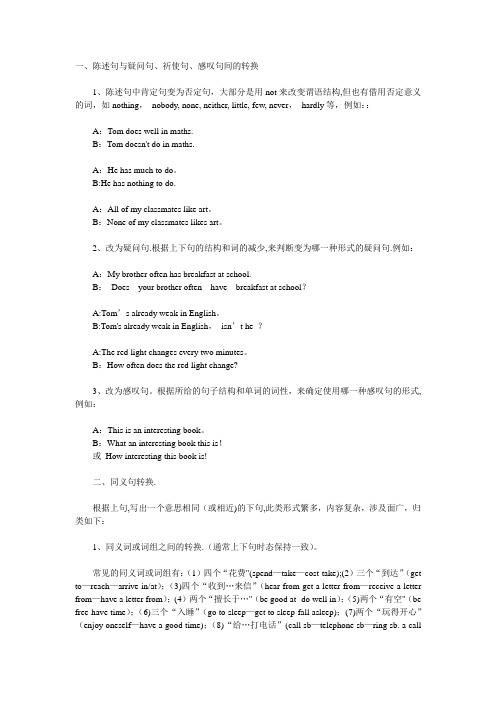
一、陈述句与疑问句、祈使句、感叹句间的转换1、陈述句中肯定句变为否定句,大部分是用not来改变谓语结构,但也有借用否定意义的词,如nothing,nobody, none, neither, little, few, never,hardly等,例如::A:Tom does well in maths.B:Tom doesn't do in maths.A:He has much to do。
B:He has nothing to do.A:All of my classmates like art。
B:None of my classmates likes art。
2、改为疑问句.根据上下句的结构和词的减少,来判断变为哪一种形式的疑问句.例如:A:My brother often has breakfast at school.B:Does your brother often have breakfast at school?A:Tom’s already weak in English。
B:Tom's already weak in English,isn’t he ?A:The red light changes every two minutes。
B:How often does the red light change?3、改为感叹句。
根据所给的句子结构和单词的词性,来确定使用哪一种感叹句的形式,例如:A:This is an interesting book。
B:What an interesting book this is!或How interesting this book is!二、同义句转换.根据上句,写出一个意思相同(或相近)的下句,此类形式繁多,内容复杂,涉及面广,归类如下:1、同义词或词组之间的转换.(通常上下句时态保持一致)。
常见的同义词或词组有:(1)四个“花费"(spend—take—cost-take);(2)三个“到达”(get to—reach—arrive in/at);(3)四个“收到…来信”(hear from-get a letter from—receive a letter from—have a letter from);(4)两个“擅长于…"(be good at -do well in);(5)两个“有空"(be free-have time);(6)三个“入睡”(go to sleep—get to sleep-fall asleep);(7)两个“玩得开心”(enjoy oneself—have a good time);(8)“给…打电话”(call sb—telephone sb—ring sb. a call—make a telephone to sb.)(9)“飞往...”(fly to...—go to...by air/plane)(10)“自学”(teach oneself —learn...by oneself)(11)在...方面帮助help...with...-help...(to)do...(12)在...差be weak in...-do badly in...(13)能/会...can-be able to(14)更喜欢...like...better than...—prefer...to (15)充满了…be full of…—be filled with…(16)放弃干…give up doing…—stop doing…(17)不再…no longer-not …any longer(18)照顾/保管take care of…-look after(19)展览on show—on display(20)阻止…干…stop…from doing—keep/prevent…from doing…(21)由于thanks to —because of…(22)举手hands up—put up one’s hands(23)最后,终于at last—in the end (24)与…不同be different from…—be not the same as…(25)从…借入…borrow…from…—lend…to…(26)乘公汽/火车/的士go to…by bus/train/taxi—take a bus /train/taxi to…(27)乘自行车去…go to…by bike—ride a bike to…(28)为…感到自豪be proud of…—be the pride of…(29)步行去…walk to…—go to…on foot (30)独自地by oneself -alone等。
中考英语同义句句型转换大全
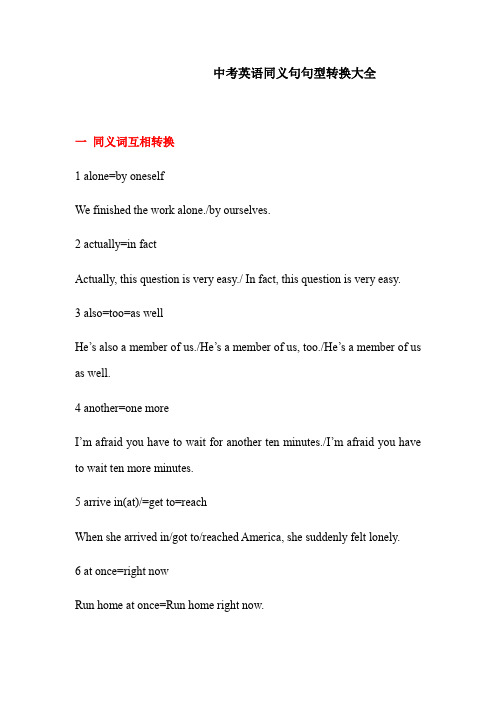
中考英语同义句句型转换大全一同义词互相转换1 alone=by oneselfWe finished the work alone./by ourselves.2 actually=in factActually, this question is very easy./ In fact, this question is very easy.3 also=too=as wellHe’s also a member of us./He’s a member of us, too./He’s a member of us as well.4 another=one moreI’m afraid you have to wait for another ten minutes./I’m afraid you have to wait ten more minutes.5 arrive in(at)/=get to=reachWhen she arrived in/got to/reached America, she suddenly felt lonely.6 at once=right nowRun home at once=Run home right now.7 continue/go onLet’s continue/go on reading the passage.8 cost=spend=take=pay(1)I spent ten yuan of/(in) buying this book../This book cost me tenyuan./I paid ten yuan for this book.(2)It took us three days to fulfill this task./We spent three days on thistask/in fulfilling this task.9 cross=go acrossBefore crossing/going across the road, please look both sides.10 sometimes/=t timesHe is a good man, but he can be really bad-tempered sometimes./at times.11 die/=ose one’s lifeThose people died/lost their lives during the earthquake.12 now/at the momentShe is talking about the problem with her classmates now./at the moment 13 else=otherWhat else/other things can you see in the picture?14 then=t that moment/at that timeShe was shopping then/at that moment/at that time, so she knew nothing about it.15 like/love/enjoy/be fond of/be interested in/care forShe likes/enjoys/loves/is fond of/is interested in/cares for collecting stamps very much.16 will/be going to/be about toThe teachers will/are going to/are about to have a meeting tomorrow afternoon.17 want/would likeDo you want to go abroad to study further?/Would you like to go abroad to study further/18 can/be able to/have the ability to doCan you tell me the way to the library?/Are you able to tell me the way to the library?/Do you have the ability to tell me the way to the library?19 visit/call onLin Tao visited/called on his grandparents last week.20 favorite/like bestWhat’s your favorite sport?/What sport do you like best?21 happen/take placeWhat happened?/What took place?22 decide/make a decision/make up one’s mindShe can’t decide/make a decision/make up her mind where to go.23 found/establish/set upThe students founded/established/set up a group to protect the environment.24 finally/at last/in the endFinally/At last/In the end, she won the race.25 leave/be awayHe left yesterday./He has been away for a day.26 return/give backHe hasn’t returned the book to me./He hasn’t given the book back to me. return/go backHe will go back/return in a month.27 why/what for/how come-She cried so badly. –How come?What did she cry so sadly for?/Why did she cry so badly?28 over/more thanOver/More than a hundred people tried this new kind of food.29 whatever/no matter whatWhatever/No matter what you find in the box, they belong to Amy.30 whenever/no matter whenWhenever/No matter when you come to see me, I will treat you as my relative.31 walk/ go…on footDo you walk to school every day?/Do you go to school on foot every day?32 should/ought to/be supposed toWe should/ought to/are supposed to use both sides of the paper to reduce wastes.33 population/peopleWhat is the population of China?/How many people are there in China?34 quit/stop/drop/give upMy father quitted/stopped/dropped/gave up smoking.35 maybe/perhaps/may beMaybe/Perhaps it is not my pen./ The pen may not be mine.二同义词组互相转换1 a lot of/lots ofA lot of/Lots of artists will show their faces at the party.2 all over the world/around the worldEnglish is spoken widely all over the world./around the world3 not as(so)…as/less thanThis book is not as(so) interesting as that one./That book is more interesting than this one.4 as…as possible/as…as sb canRun home as fast as possible/as fast as you can to tell your mother the good news.5 at risk/in danger/in troubleThe pandas in our country are at risk./in trouble/in danger6 at the age of…/when sb.+be+…years oldHis parents died when he was six years old./His parents died at the age of six.7 because of/due to/as a result of/with one’s help/thanks toBecause of?/Due to/As a result of his help, he passed this exam.With his help/With the help of him, he passed the exam./Thanks to his help, he passed the exam.8 be careful/look out/take careLook out!/Be careful/Take care! The flood is coming.9 be worried about/worry aboutLiu Ming is worried about his following oral test./Liu Ming can’t stop his following oral test.10 both…and…/not only…but also…He is not only a singer but also a doctor./He is both a singer and a doctor.11 be good at/do well inHe is good at drawing./He does well in drawing.12 be proud of/take pride inWe are all proud of our country’s astronaut./He takes pride in ourcountry’s astronaut.13 come up with/think of/have an ideaTome came up an idea./Tom thought of an idea./Tom had an idea.14 ride a bike/go…by bikeHe often rides a bike to work./He often goes to work by bike.15 come from/be fromWhere do you come from?/Where are you from?16 have a good time/enjoy oneself//play happilyWe had a good time/enjoyed ourselves/played happily on Christmas Day.17 have a pain in head/have a headacheHe didn’t go to school today, because he had a pain in head./had a headache18 hear from/receive(get) a letter fromShe is very happy to hear from/receive a letter from a Canadian friend. 19 had better do/It’s best to doYou had better read in the sun./It’s best for you to read in the sun.20 how about/what aboutHow about/What about going skating?21 in order to/in order that/to do/so thatHe worked day and night to be a successful man./He worked day and night in order to be a successful man./He worked day and night in order that he could be a successful man./He worked day and night so that he could be a successful man.22 keep off/keep away fromKeep off /Keep away from the grass!23 in/wearShe is in/wears a white dress today.24 keep sb. from doing/stop sb. (from) doing/prevent sb. (from) doing Trees can stop the soil flowing away./ Trees can prevent the soil flowing away./Trees can keep the soil from flowing away.25 learn …by oneself/ teach oneselfNobody taught him. He learnt it by himself./He taught himself.26 like …better than/prefer…to…/prefer to do…rather than do …John likes swimming better than skating./John prefers swimming to skating./John prefer to swim rather than skate.27 long, long ago/once upon a timeLong, long ago/Once upon a time, there was a beautiful princess living in an old castle.28 look after well/take good care ofThanks for looking after my cat /taking good care of my cat well while I was away.29 no longer/not …any longerShe is no longer a little girl./She is not a little girl any longer.30 shall we/Let’s..Shall we watch the film together?/Let’s watch the film together.31 take part in/join in/participate inHe took part in /joined in/participated in the match.32 too…to/so…that…/enough to…He is too busy to visit us./He is so busy that he can’t visit us./He is not free enough to visit us.三同义句型互相转换1运用两种时态(一般过去时和现在完成时互相转换)(1)He left last year.(2)He has been away for one year.(3)He has been away since a year ago.(4)It is a year since he left.(5)One year has passed since he left.2最高级和比较级的互相转换(1)He is the tallest student in his class.(2)He is taller than any other student in his class.(3)He is taller than the other students in his class.(4)No one else is taller than him in his class.3运用两种语态(主动语态和被动语态互相转换)I clean my room every day./My room is cleaned every day. 4感叹句的两种句型之间互相转换What a careful girl she is!/How careful the girl is!5运用关联词语合并句子(1)Amy can’t dance. Susan can’t, either.Neither Amy nor Susan can dance.(2)I has eaten breakfast and my mother has eaten it, too.Both my mother and I have eaten breakfast.6运用复合句和不定式互相转换(1)I hope that I can visit the moon one day./I hope to visit the moon oneday.(2)He told me how he could use a computer./He told me how to use acomputer.7运用不同的句式结构互相转换(1)She wants to go shopping and her friends want to go shopping,too./She wants to go shopping, and so do her friends.(2)He went to bed after he finished his homework./He went to bed afterfinishing his homework./He didn’t go to bed until he finished his homework.(3)Come on, or we’ll miss the early bus./If we don’t hurry, we’ll miss theearly bus.(4)The man gave us a talk last week, and he will give us another talk thisweek./The man who gave us a talk last week will give us another talk this week.8用it做形式主语互相转换(1)He can finish the work easily./It is easy for him to finish the work.(2)We found it hard to shake./We found it was hard to skate.。
初中英语语法——句型转换之同义句
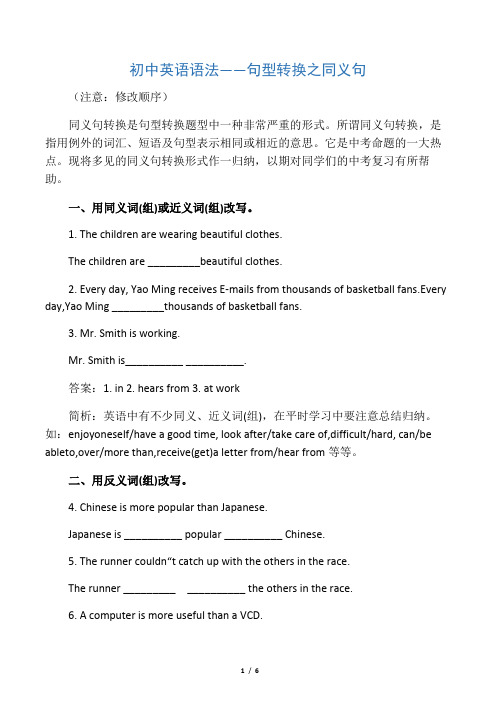
初中英语语法——句型转换之同义句(注意:修改顺序)同义句转换是句型转换题型中一种非常严重的形式。
所谓同义句转换,是指用例外的词汇、短语及句型表示相同或相近的意思。
它是中考命题的一大热点。
现将多见的同义句转换形式作一归纳,以期对同学们的中考复习有所帮助。
一、用同义词(组)或近义词(组)改写。
1. The children are wearing beautiful clothes.The children are _________beautiful clothes.2. Every day, Yao Ming receives E-mails from thousands of basketball fans.Every day,Yao Ming _________thousands of basketball fans.3. Mr. Smith is working.Mr. Smith is__________ __________.答案:1. in 2. hears from 3. at work简析:英语中有不少同义、近义词(组),在平时学习中要注意总结归纳。
如:enjoyoneself/have a good time, look after/take care of,difficult/hard, can/be ableto,over/more than,receive(get)a letter from/hear from等等。
二、用反义词(组)改写。
4. Chinese is more popular than Japanese.Japanese is __________ popular __________ Chinese.5. The runner couldn“t catch up with the others in the race.The runner _________ __________ the others in the race.6. A computer is more useful than a VCD.A VCD is not _________useful _________a computer.答案:4. less, than 5. fell behind 6. as,as简析:此类转换应注意有时主语位置会改变,并要特别总结归纳反义词(组)。
同义句转换类型大全初中英语

1.第三章句型转换表述同一意思,可以用多种不同的表达方式。
这在英语学习中表达为运用不同句型来表述同一意思。
细微而言,表述同一意思的各个不同句型各有其语义上的倾重点;但一般情况下,尤其是对初学者而言,这种细微的“异〞并不要求强调。
换言之,是要求从“同〞的角度来看待表述同一意思的不同句型。
本章拟以列举实例的方式来作一综合介绍。
一、一句多讲今天天气怎么样?Howistheweathertoday?Whatistheweatherli ketoday?你怎么啦?Whatisthematter withyou?What’syourtroub le?What’swrongwithyou?是上学的时候了。
It’stimeforschool.It’stimetogotoschool.这男孩今天16岁了。
Theboyissixteen(yearsold).Theboyisatthe ageofsixteen.Heisaboyofsixteen.我把门翻开你不介意吧?DoyoumindifIopenthedoor?Doyoumindmyopen ingthedoor?他每天花1小时做作业。
Ittakeshimanhourtodohishomew orkeveryday.Hespendsanhour(in)doinghishomewo rkeveryday. Hespendsanhouronhishomeworkeveryday.自从1992年以来上海发生了巨大的变化。
GreatchangeshavetakenplaceinShan ghaisince1992. TherehavebeengreatchangesinShanghaisince1992. Shanghaihaschangedalotsince1992.她的父亲去世5年了。
Herfatherdiedfiveyearsago. Herfatherhasbeendeadforfiveyears.Itisfiveyearssinceherfatherdied.10.(这里用Ithasbeenfiveyears亦可。
中考英语《句型结构》知识点:同义型句型转换

中考英语《句型结构》知识点:同义型句型转换
为您整理“中考英语《句型结构》知识点:同义型句型转换”,欢迎阅读参考,更多有关内容请继续关注本网站中考栏目。
中考英语《句型结构》知识点:同义型句型转换
同义型句型转换
同义型句型转换即是用另一种方式来表述与原句相同的句意,也称作同义句转换,主要考查学生对句型及词汇的掌握情况。
【真题引导1】
I prefer walking there to going by bus.
I prefer to walk there ___ by bus.
【答案与解析】
该题考查prefer...to...与prefer...rather than...这两个句型的转换。
前者后接动词时用V.+ing形式,而后者则接不定式,并且rather than 后的不定式符号要省略。
答案:rather than go。
初中英语同义句转换的九种类型
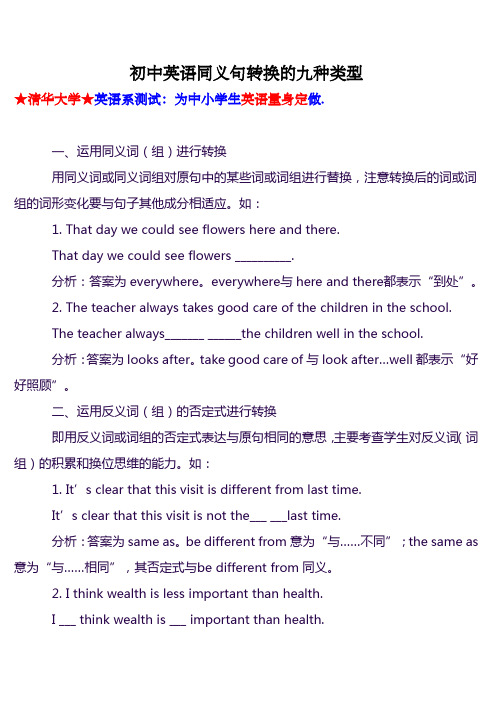
初中英语同义句转换的九种类型★清华大学★英语系测试:为中小学生英语量身定做.一、运用同义词(组)进行转换用同义词或同义词组对原句中的某些词或词组进行替换,注意转换后的词或词组的词形变化要与句子其他成分相适应。
如:1. That day we could see flowers here and there.That day we could see flowers __________.分析:答案为everywhere。
everywhere与here and there都表示“到处”。
2. The teacher always takes good care of the children in the school.The teacher always_______ ______the children well in the school.分析:答案为looks after。
take good care of与look after…wel l都表示“好好照顾”。
二、运用反义词(组)的否定式进行转换即用反义词或词组的否定式表达与原句相同的意思,主要考查学生对反义词(词组)的积累和换位思维的能力。
如:1. It’s clear that this visit is different from last time.It’s clear that this visit is not the___ ___last time.分析:答案为same as。
be different from意为“与……不同”;the same as 意为“与……相同”,其否定式与be different from同义。
2. I think wealth is less important than health.I ___ think wealth is ___ important than health.分析:答案为do n’t,more。
同义句转换——精选推荐

同义句转换1,arrive in /at = get to =reach 2, be from = come from3,be full of =be filled with 4,be in = at home5,be on a visit to = visit 6,be late for =come late to7,be fine =be well =be OK 8,be able to =can9,be awat =be out 10,be busy doing sth =be busy with sth 11,be pleased =be glad =be happy 12,buy sb sth =be busy with sth 13,be up =get up 14,catch up with =keep up with15,catch a bus =take a bus 16,catch a cold =have a cold17,come into =step into 18,come on =come along19,come down = get down 20,do well in =be good at21,do the shopping =go shopping 22,drop off =get off23,enjoy doing sth =like doing sth 24,have a good time =enjoy oneself 25,fall down =fall off 26,get the telephone =answer the telephone 27,give sb sth =give sth to sb 28,give sb the message =give the message to sb 29,geve sb a talk =give a talk to sb 30,give a concert =have a concert31,get on well with sb =be good to 32,give…a call =give …a ring33,go down =go along 34,go for a swim =go swimming35,go on doing sth =go on with sth 36,go up = go along37,go to sleep =get to sleep =fall asleep 38,have a look (at)=look at39,have a swim =go swimming 40,have got =have41,hear from =receive a letter from=have a letter=get a letter from42,help sb with sth =help sb to do sth 43,hold a meeting =have a meeting 44,hold on =wait a minute 45,hurry up =be quick 46,knock at =knock on 47,last from …to =be from …to48,like doing sth =like to do sth 49,look out =be careful50,love to do sth =like to do sth 51,make up one’s mind to do =set one’s mind to do 52,pay for =spend on 53,prefer…to =like …better than 54,ring up =call sb 55,send for sb =ask sb to come56,show sb sth =show sth to sb 57,take care of =look after58,take exercise =do sport 59,take a message =leave a message 60,take a message for sb =give a message to sb 61,think about =think of62,turn off =turn down 63,teach oneself =learn by oneself 64,turn right at the …crossing =take the ..turning on the right65,walk on =go along 66,walk to =go to ..on foot67,walk along =go along 68,at school =in the school69,a lot of =lots of ( many;much) 70,a lot =very much71,a quarter past two =two fifteen 72,at times =sometimes73,at last =in the end =finally 74,a bit =a little =a few75,a moment ago =just now 76,at once =right now =right away77,at noon =in the middle of a day =at 12 o’clock78,at that moment =at that time =just then79,at the doctor’s =in the doctor’s office 80,at the moment =at the same time 81,all over the world =across the world =around the world =in the world82,a moment later =later on 83,after a while =a moment later84,all the time =always 85,as soon as possible =as quick as possible 86,in line =in a queue 87,in the southern part of =in the south of 88.in the day =in the daytime 89,much of China =many p;aces of China 90,more than =over 91,two morebooks=another two books 92,no longer =not…any longer =no more =not any more93,not far from =near to 94,North China =the north of China 95,of course =certainly96,plenty of =quite a few =a lot of =lots of =large number of =a great many of =a good deal of97,two and a half years =two years and a half98,It’s time for +名词=It’s time to+动词99,what other things =what else 100 ,not pass =fail to do101,take a +交通⼯具to sp =go to sp by +交通⼯具102,walk to sp =go to sp on foot 103,go to sp in a hurry =hurry to sp 104,provide sth for sb =provide sb with sth105,be proud of =take pride in106,how much is sth ?=What’s the price of sth ?107,be good at =do well in。
初中英语语法——句型转换之同义句-2100字高三作文
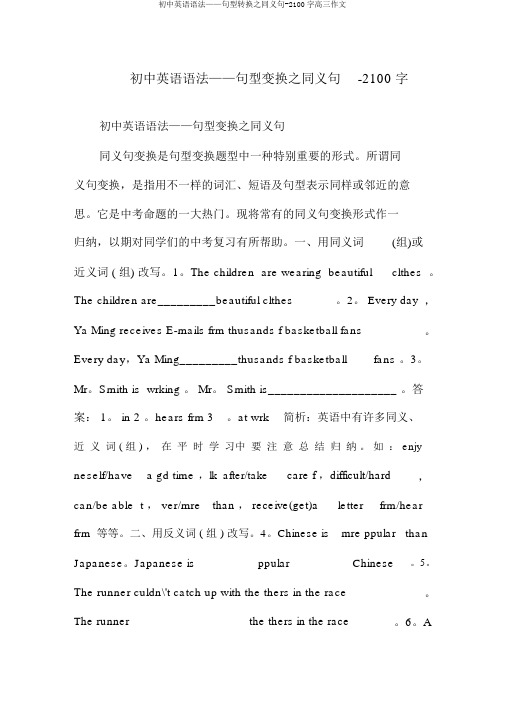
初中英语语法——句型变换之同义句-2100 字初中英语语法——句型变换之同义句同义句变换是句型变换题型中一种特别重要的形式。
所谓同义句变换,是指用不一样的词汇、短语及句型表示同样或邻近的意思。
它是中考命题的一大热门。
现将常有的同义句变换形式作一归纳,以期对同学们的中考复习有所帮助。
一、用同义词(组)或近义词 ( 组) 改写。
1。
The children are wearing beautiful clthes 。
The children are_________beautiful clthes。
2。
Every day,Ya Ming receives E-mails frm thusands f basketball fans。
Every day,Ya Ming_________thusands f basketball fans。
3。
Mr。
Smith is wrking 。
Mr。
Smith is____________________ 。
答案: 1。
in 2 。
hears frm 3。
at wrk简析:英语中有许多同义、近义词 ( 组 ) ,在平时学习中要注意总结归纳。
如: enjy neself/have a gd time,lk after/take care f ,difficult/hard,can/be able t , ver/mre than , receive(get)a letter frm/hear frm等等。
二、用反义词 ( 组 ) 改写。
4。
Chinese is mre ppular than Japanese。
Japanese is__________ppular__________Chinese。
5。
The runner culdn\'t catch up with the thers in the race。
The runner___________________the thers in the race。
- 1、下载文档前请自行甄别文档内容的完整性,平台不提供额外的编辑、内容补充、找答案等附加服务。
- 2、"仅部分预览"的文档,不可在线预览部分如存在完整性等问题,可反馈申请退款(可完整预览的文档不适用该条件!)。
- 3、如文档侵犯您的权益,请联系客服反馈,我们会尽快为您处理(人工客服工作时间:9:00-18:30)。
初中英语语法——句型转换之同义句(注意:修改顺序)同义句转换是句型转换题型中一种非常重要的形式。
所谓同义句转换,是指用不同的词汇、短语及句型表示相同或相近的意思。
它是中考命题的一大热点。
现将常见的同义句转换形式作一归纳,以期对同学们的中考复习有所帮助。
一、用同义词(组)或近义词(组)改写。
1. The children are wearing beautiful clothes.The children are _________beautiful clothes.2. Every day, Yao Ming receives E-mails from thousands of basketball fans.Every day,Yao Ming _________thousands of basketball fans.3. Mr. Smith is working.Mr. Smith is__________ __________.答案:1. in 2. hears from 3. at work简析:英语中有不少同义、近义词(组),在平时学习中要注意总结归纳。
如:enjoy oneself/have a good time, look after/take care of,difficult/hard, can/be able to,over/more than,receive(get)a letter from/hear from等等。
二、用反义词(组)改写。
4. Chinese is more popular than Japanese.Japanese is __________ popular __________ Chinese.5. The runner couldn't catch up with the others in the race.The runner _________ __________ the others in the race.6. A computer is more useful than a VCD.A VCD is not _________useful _________a computer.答案:4. less, than 5. fell behind 6. as,as简析:此类转换应注意有时主语位置会改变,并要特别总结归纳反义词(组)。
如:new-old, big-small, long-short, more than-less than等。
三、用同义句型改写。
7. Ann spent two weeks getting ready for the exams.It ________Ann two weeks to __________ ready for the exams.8. She spent 30 dollars on the English-Chinese dictionary.The English-Chinese dictionary __________ ___________ 30 dollars.答案:7. took, get 8. cost her简析:此类转换必须弄清每个句型的构成特点,而且还要注意句中每个句型的固定搭配。
如:give sb. sth.与give sth. to sb.的转换,spend some time(in)doing sth./on sth.与It takes sb.some time to do sth.的转换等等。
四、二句并一句转换为简单句。
9. Jim doesn't like noodles,and Jack doesn't,either._________Jim_________Jack likes noodles.10. Mrs. Smith is my teacher. She is also my good friend.Mrs. Smith is_________ _________my teacher_________ _________my good friend.答案:9. Neither,nor 10.not only,but also简析:英语中常用not only... but also,either... or,neither... nor,both... and 等连词把两个意义相关的简单句合并成一个简单句。
解题过程中要注意连词的选用和主谓一致原则。
除此之外,还可用too... to,enough to等把两个简单句合并成另一简单句。
如:Tom is young. He can't go to school.→Tom is too young to go to school.五、用派生词或多义词改写。
11. The snow was heavy last night.It_________ _________last night.答案:snowed heavily简析:句中名词snow和形容词heavy转换成了动词snowed和副词heavily。
六、并列句与复合句的互换。
12. If you play basketball here,you may break the windows._________play basketball here,_________you may break the windows.13. Go on planting trees for two more years and the hill will be covered with green trees.If we go on planting trees,the hill will_________ _________in two_________ _________.答案:12. Don't,or 13. turn green,years' time简析:含有祈使句的并列句,可转换为含if条件句的复合句。
七、简单句与复合句的互换。
14. Do you know how you can get the kite down from the tree?Do you know_________ _________get the kite down from the tree?答案: how to简析:复合句转换为简单句一般侧重于将从句变化为短语或词组,使其句意简单明了。
常见的转换方法有:(1)用不定式替换、用介词短语替换、用名词短语替换、用分词短语替换;(2)将宾语从句简化为"疑问词+不定式";(3)将so... that... (such... that... )引导的状语从句简化为含有too... to... (或enough to)的简单句;(4)将if引导的状语从句简化为"祈使句,and(or)+句子"。
八、综合转换。
15. Something is wrong with that machine.That machine_________ _________.答案:doesn't work简析:综合转换是在整体把握句意的基础上,对原句重新进行概括表达,它在词汇、结构等多方面都有较大的变化。
至于一些特殊形式的变化,同学们在解题过程中要不断归纳总结,彻底掌握它们。
下面就请你做几道练习题一试身手吧!1. Bike is short for bicycle.Bike is_________ _________ _________saying bicycle.2. It took Mary an hour to do her homework last night.Mary________ an hour _________her homework last night.3. They made him work 12 hours a day.He_________ _________ _________ _________ 12 hours a day.4. I am a League member. He is a League member,too._________ he_________ I _________League members.5. He is so young that he can't join the army.He is _________ young________ the army.6. The player smiled and jumped into the river.The player jumped into the river_________ _________ _________.7. Mr. Brown left London six years ago.Mr. Brown _________ _________ _________ _________London for six years.8. The earth is bigger than the moon.The moon Is _________ _________ _________ _________the earth.9. He is one of my friends.He is a friend _________ _________.10. The teacher told us that we should not meet at the school gate.The teacher told us_________ _________ _________at the school gate.11. I have something to tell you. It's interesting.I have _________ _________ to tell you.12. I saw them playing basketball there.I saw _________they_________ _________basketball there.13. Listen carefully,and you'll become more interested._________ _________listen carefully, you'll become more interested.14. She has been a nurse for five years.It_________ _________ _________ _________she became a nurse.15. All are here, but our English teacher isn't._________is here _________our English teacher.16. It was so interesting a film that all of us saw it twice.It was_________ _________interesting _________that all of us saw it twice.17. Mother was busy with some housework when I got home.Mother was_________ _________some house-work when I got home.参考答案:1. another way of2.spent;on/doing3. was made to work4. Both;and;are5. too;to join6. with a smile7. has been away from8. not as/so big as9. of mine 10. not to meet 11. something interesting 12. that;were playing 13. If you 14. is five years since 15. Everyone/Everybody,except/but 16. such an;film 17. busy doing。
